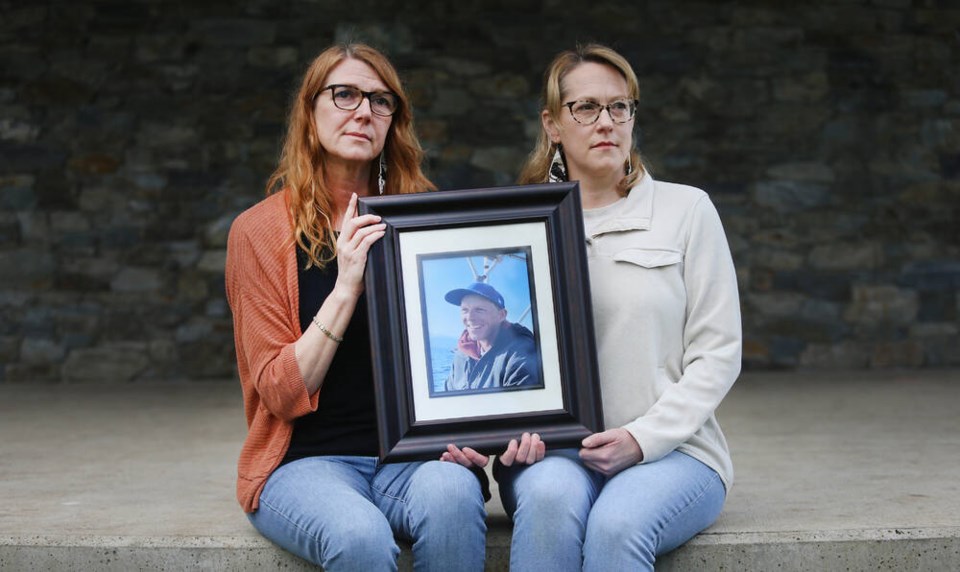BC United’s mental-health critic is proposing changes to improve communication with family members of patients in a mental-health crisis, in the wake of a Victoria man’s death.
If passed, the Mental Health Amendment Act would ensure family members are consulted when a close relative is certified, notified before a loved one is discharged from involuntary psychiatric care, and advised if a patient has withdrawn “information sharing.”
Mental-health critic Elenore Sturko, who introduced the private member’s bill this week, cited the example of James Zimmer, who died Feb. 9, 2023 by suicide within hours of being discharged from Royal Jubilee Hospital. His family and others were at the legislature this week to lend support to the bill.
Zimmer, 50, had struggled with depression and anxiety, alcohol use, paranoia and suicidal thoughts.
When he was hospitalized — involuntarily or voluntarily — his family had consent to inquire about his care and be informed about his discharge plans.
But that didn’t happen on Feb. 9.
“By informing family members of a patient’s discharge before their release, we can proactively ensure the supports are in place,” Sturko said in an interview. “What if Royal Jubilee had contacted James’s sister?”
Cindy Zimmer had admitted her brother involuntarily to Royal Jubilee Hospital’s psychiatric emergency services on Feb. 7 after finding him shivering along a path in Oak Bay with plans to kill himself.
They talked, he warmed up in her vehicle, and he went back to Royal Jubilee’s psychiatric unit and told hospital staff his “immediate and detailed” plan for ending his life, Cindy Zimmer said.
Cindy Zimmer asked to be called if her brother was due to be discharged and her brother agreed. Their sister Crystal Kenzie, who had earlier talked to her brother by phone for hours, trying to determine his whereabouts, said she was relieved that her brother was back in safe hands.
Just two days later, Cindy Zimmer had a bad feeling and phoned the hospital’s patient information line around noon. She was relieved to be told her brother was still in the hospital’s psychiatric emergency services unit.
On the morning of Feb. 10, however, sister Kenzie called to inquire about her brother and was told he had been discharged a day earlier.
James Zimmer was found deceased by a hiker in Saanich.
“When I saw the police at the door, I just started screaming and yelling,” said Cindy Zimmer.She said knew what they would tell her.
The hospital told family members that James Zimmer was discharged on Feb. 8 — having revoked permission for family to be contacted about his departure — but was voluntarily readmitted a few hours later for suicidal thoughts, then discharged again on Feb. 9.
The sisters say the proposed amendments are a small but necessary step to help safeguard individuals from falling through the cracks of the mental-health-care system. “I feel like this amendment to the act could have been the thing — if followed through on — that could have actually saved our brother’s life, because we would have received that call,” Cindy Zimmer said in an interview.
Either way, they say, had they been called ahead of his discharge or notified of his withdrawal of consent, they would have known he was in trouble. “They created the crack that our brother fell through.”
Zimmer said her brother’s erratic behaviour and change in consent authorizations within hours should have raised numerous “red flags” that he was “vulnerable and in crisis.”
Sturko said the Privacy Act is important in protecting information government bodies collect on citizens, but in this case, patient privacy rights are overshadowing common sense and even patient safety in some cases. “It’s not records that we are trying to protect, it’s people,” she said.
Section 34 of the act allows people to be involuntarily held in hospital if they require supervision to protect themselves or others because of a mental-health disorder. It also says relatives must be informed of an involuntary patient’s admission and discharge.
“But that’s not being followed through with,” said Sturko.
“I know there’s many complaints with health authorities and with the government with regard to this problem.”
What families are “really crying out for” is better communication, in particular when people are going to be released, she said.
James Zimmer’s sisters met with Dix in October and have since corresponded with Mental Health and Addiction Minister Jennifer Whiteside.
In a Dec. 8 letter, the minister pointed to the 2005 Guide to the Mental Health Act, which says when an involuntary patient is discharged, the facility must immediately inform a near relative, but when a voluntary patient is discharged, there is no requirement to inform — although relatives “should” be notified in situations where it would be beneficial to the care of the patient as determined by the patient’s care team.
Whiteside said updates to the guide are underway.
Sturko said her amendments aren’t major changes and apply to a small number of people in emergency psychiatric crisis.
“I think we have to look at what is in the best interest of each individual … err on the side of caution to make sure that that safety net is there, that there aren’t gaps for very vulnerable people who are dealing with some very serious mental illnesses to fall through.”
> Help is available by phoning the 9-8-8 suicide hotline. Or go online to



